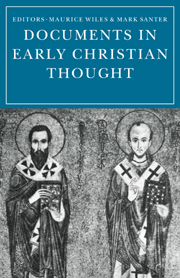5 - SIN AND GRACE
Published online by Cambridge University Press: 17 August 2009
Summary
The most famous controversies of the patristic period were concerned with the Trinity and the person of Christ. But it will already be evident from the extracts dealing with these themes that the concern of the Fathers was to understand the persons of the Godhead in a way which safeguarded the reality of man's redemption. The extracts in this section deal with the fact of sin in human life and God's grace in relation to it.
In the first passage Origen uses his Platonism as a key to understanding the data of Scripture. He argues for a premundane fall of human souls as the only way in which God's justice can be squared with the apparent unfairness of differing human lots. This line of thought, however, did not commend itself to the Church as a whole.
The comparatively long extract from Gregory of Nyssa gives an account of the emergence of evil in the world in terms of man's free-will, without recourse to Origen's idea of the pre-existence of souls. The passage is one in which the Platonist character of Gregory's thought is particularly clear. The argument is developed in a way which not only frees God from responsibility for that evil but also sets the scene for his redemptive grace.
That redemption was effected by the death of Christ. But why was that death the means by which God worked man's salvation? The patristic age offers no clear-cut agreed answer to that question.
- Type
- Chapter
- Information
- Documents in Early Christian Thought , pp. 95 - 126Publisher: Cambridge University PressPrint publication year: 1975



